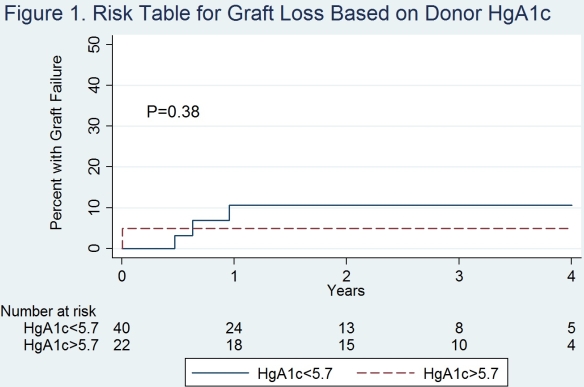Impact of Donor Hemoglobin A1c On Pancreas Graft Survival
1Abdominal Transplant, Washington University, Saint Louis, MO
2Surgery, Johns Hopkins University, Baltimore, MD.
Meeting: 2015 American Transplant Congress
Abstract number: C207
Keywords: Graft function, Pancreas transplantation, Risk factors, Survival
Session Information
Session Name: Poster Session C: More Controversies in Pancreas Transplantation
Session Type: Poster Session
Date: Monday, May 4, 2015
Session Time: 5:30pm-6:30pm
 Presentation Time: 5:30pm-6:30pm
Presentation Time: 5:30pm-6:30pm
Location: Exhibit Hall E
A goal in selection of ideal donor pancreata is to avoid grafts with a predisposition to type-two diabetes. The HgA1c assay is a validated estimate of mean blood glucose over a 2-3 months period and is currently used in prediction and diagnosis of diabetes. Our goal was to assess the utility of HgA1c on graft survival and function. We reviewed all pancreas transplants performed at our center between 2009-2014. In accordance with the ADA criteria for pre-diabetes classification, we used a HgA1c cut off of 5.7 mmol/mol. We used Kaplan-Meier methodology to examine graft survival. We included 62 recipients, for whom donor HgA1c was available, in the analysis. Mean donor HgA1c was 5.5 (SD 0.43). Overall, there were four graft failures in our cohort. The recipients had the following donor HgA1c values: 5.1, 5.3, 5.4, and 5.8. There was no statistically significant difference in graft failure among those who had a donor HgA1c >5.7 in comparison to those who did not. At 1 year, mean recipient HgA1c was 5.4 (SD 0.77). There was no association between donor HgA1c and recipient HgA1c at one year. HgA1c is an accepted measure of average glycemic control. While it has the potential to serve as a tool in the selection of donors for pancreas graft donation, it has not correlated with graft survival or glucose intolerance at our center.
At 1 year, mean recipient HgA1c was 5.4 (SD 0.77). There was no association between donor HgA1c and recipient HgA1c at one year. HgA1c is an accepted measure of average glycemic control. While it has the potential to serve as a tool in the selection of donors for pancreas graft donation, it has not correlated with graft survival or glucose intolerance at our center.
To cite this abstract in AMA style:
Collins K, Garonzik-Wang J, King E, Doyle M, Lowell J, Shenoy S, Lin Y, Wellen J, Chapman W, Segev D. Impact of Donor Hemoglobin A1c On Pancreas Graft Survival [abstract]. Am J Transplant. 2015; 15 (suppl 3). https://atcmeetingabstracts.com/abstract/impact-of-donor-hemoglobin-a1c-on-pancreas-graft-survival/. Accessed February 19, 2026.« Back to 2015 American Transplant Congress
